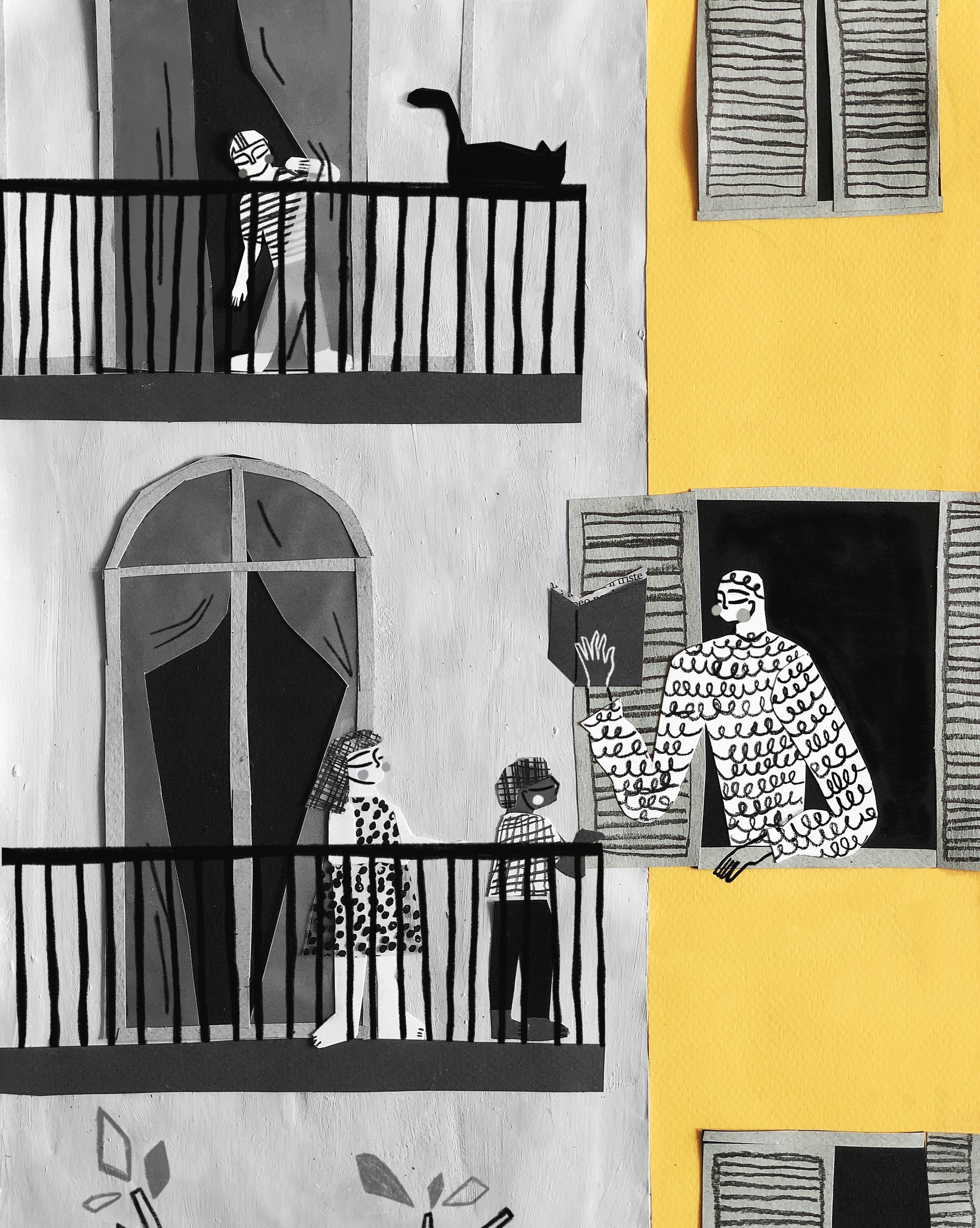
Today is Day 74 of a long, strict lockdown here in Spain.
It seems as good a time as any to reflect on some of the valuable lessons I’ve learnt from my Spanish neighbours. Lessons I’ll definitely be taking forward to the “new normal“—whatever that might be!
On March 14, 2020, the Spanish Prime Minister, Pedro Sánchez, declared a state of emergency, in response to the COVID-19 outbreak. As one of the worst affected countries in the world, the whole of Spain was ordered to stay at home with immediate effect. Our lives changed drastically, overnight, with no time to prepare ourselves mentally or physically.
As a U.K. citizen, currently residing in Spain, I had to make a decision (based on f*ck all factual information) whether to stay put or flee to my homeland to be with my family and close friends. I have no memory now of why I chose to stay in Spain, but after 74 days of lockdown (and counting) I can honestly say it was totally the right decision for me.
Of course, I’ve missed my friends and family, and have daily envy of their easy-breezy U.K. lockdown, where they get to go outside to exercise whenever they like, go to work, shop where they like, not wear face masks…
I’ve been living vicariously through them, via Skype, these past two months.
However, by staying in Spain—where my life has consisted solely of being on my own in my apartment with one weekly trip to the local shop for food (and wine, of course)—I’ve learned so many valuable life lessons from my Spanish community. Lessons that have not only helped me to survive lockdown, but will also serve me well for many years to come.
Here are my top three lockdown lessons from Spain:
1. One step at a time
I’ve been living and teaching in the Andalucia province of Spain for four years now, and there’s a particular phrase that I must have heard at least once a day since I arrived: poco a poco (one step at a time/little by little).
The Andaluz in particular, among the Spanish, have absolutely no sense of urgency—and so this phrase is used for pretty much everything. If you mention your frustration at not learning Spanish quickly enough: poco a poco. When the plumber has taken three times as long to finish a job than quoted: poco a poco. If a relative has been unwell and is slow to recover: poco a poco. When you feel you’re not making sufficient progress in teaching a class of unruly children: poco a poco.
You get the idea.
This laid back approach to all aspects of life can sometimes be incredibly frustrating—especially for someone who has come from the hustle and bustle of busy city life and is used to speed and urgency.
And then, the COVID-19 pandemic arrived, and for the very first time, I finally understand and appreciate the power of this relaxed Andaluz mentality.
For a nation used to outdoor living, eating out, large family gatherings, fiestas, and parades—not to mention an abundance of hugging and kissing—you might expect this severe lockdown to be tough. And it is. However, with the “poco a poco” mindset, it genuinely feels possible. We can get through this without going completely insane.
Don’t spend too much time mourning the loss of things from the past. Don’t spend too much time stressing about, or racing towards the future. Just settle into this moment, and then the next, and then the next…
Accept what is. Just take one small step at a time.
“The key is this: meet today’s problems with today’s strength. Don’t start tackling tomorrow’s problems until tomorrow. You do not have tomorrow’s strength yet. You simply have enough for today.” ~ Max Lucid
2. Family & community matter
I’m a self-confessed introvert and semi-recluse. I moved to Spain on my own, and I’ve enjoyed living the quiet, independent life. The Spanish think I’m weird because they crave company and are always surrounded by family and friends. There is no silence to be found in Spain.
“No [wo]man is an island.” ~ John Donne
During this time of isolation, I’ve come to the realisation that I’m not actually designed for life as a recluse. We all need connection. I’ve really missed the little daily interactions within my community. I took them for granted.
A friendly chat in the lobby with a neighbour, a simple wave and smile from the waiter at my local café, having my Spanish corrected by the old ladies at the fishmongers…
As we go about our daily lives in this community we feel seen and acknowledged—it is far from lonely. It wasn’t until the state of alarm was announced, and these daily exchanges stopped that I appreciated just how vital they are to my well-being.
The entire community here has rallied, supporting one another and protecting their elderly, homeless, and disabled. By word of mouth, the 8 p.m. applause began on day two—everyone came out on their doorstep/balcony/terrace to clap and cheer key workers (usually followed by joyous singing, the national anthem, and much chatting). Everyone joined in—without exception—to show appreciation for those holding the community together while we cannot.
Even though there are over 22,000 people living in this town, it feels like a much smaller community, in which everyone is working together for the greater good. Almost everyone is abiding by the rules for staying at home, wearing facemasks outdoors, keeping a safe physical distance, and adhering to the set times allocated for the elderly to go shopping safely—all with the usual Spanish good humour.
No one is being left behind. In this way, there have been only 10 cases of COVID-19 recorded here since March 14th.
It feels amazing to be part of something bigger than ourselves—a belonging, connection, to know that people really care, and to witness daily acts of kindness, generosity, and solidarity. When the lockdown is eased, I’m definitely going to be more involved in community projects and finding ways to be of benefit, as a thank you for all the love and kindness I’ve received here (even though I’m still “the foreigner”).
3. A daily routine is vital
I’ve always loathed routine and preferred a more chaotic kind of existence, which has worked out pretty well for me—until now. After about 10 days of lockdown, it became pretty clear to me that if I didn’t pull myself together and have some sort of daily routine, I would be in trouble. Eating flapjacks for lunch at 4 p.m., having skipped breakfast, and binge-watching episodes of “Normal People” until 3 a.m. was not going to end well.
Whilst they can be fabulously spontaneous and fun, the Spanish do tend to carry out a lot of specific activities every day, at specific times, like clockwork (possibly a hangover from the Franco era). For example, everyone stops work at 11 a.m. for morning coffee, at 2 p.m. for lunch, and at 9 p.m. for dinner—without fail. They have set routines for mealtimes, for meeting up with friends and family, for holidays, and even for certain conversations.
“Nothing will sustain you more potently than the power to recognize in your humdrum routine, as perhaps it may be thought, the true poetry of life.” ~ Sir William Osler
Because I live in an apartment block where I can hear most of the goings-on of all my neighbours, it’s been easy to settle into the same rhythm as those around me for mealtimes, siestas, the 8 p.m. applause, and bedtime. There is something quite magical about being alone, whilst also in total synchronicity with our neighbours throughout these days. It feels as if we’re living and breathing as one unit.
I’ve learnt that routine is essential for my mental and physical health, and I’ll definitely be keeping up with daily yoga, meditation, mealtimes, bedtimes once lockdown is lifted. (I’ll save being spontaneous and chaotic for the gaps in between.)
During the first few weeks, I really couldn’t see anything positive coming out of this enforced, solitary confinement. Now, I feel so grateful to have had this precious time to really see and appreciate what matters most.
I fully appreciate how fortunate I’ve been in my lockdown experience, when many others have not. There’s been too much political posturing, the economic situation is a disaster, and the loss of lives is too high. My heart goes out to all those who’ve lost loved ones and those who continue to fight for their lives.
The 10-day period of national mourning, announced this past weekend, will give us all an opportunity to properly reflect on, and respectfully mourn, the loss of lives as a nation. There is a huge uphill struggle ahead of us, but by continuing to work together for the benefit of all, I believe we will succeed.
I’d love to hear from people around the world, to know what you’ve learnt from your neighbours and communities during these last few months—and any lessons that you’ll be taking forward.
~


 Share on bsky
Share on bsky




Read 19 comments and reply